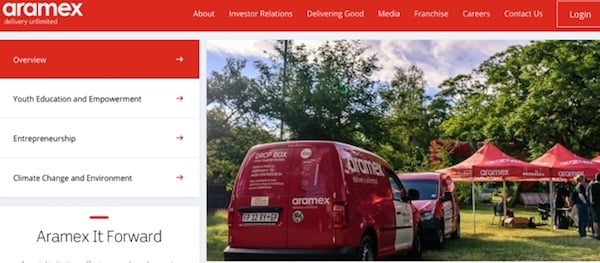
Aramex has found shipping and logistics success in serving geographic markets that other providers ignore.
Aramex is a United Arab Emirates-based shipping and logistics firm launched in 1982. It has found success in serving geographic markets that other providers ignore. While Aramex’s reach has been bolstered by acquisitions, its global network is supported mostly by partnerships with other logistics and transportation companies around the world. However, the company is expanding its international footprint through acquisitions in Africa and Southeast Asia.
Aramex is publicly traded on the Dubai Financial Market. It employs 18,000 people in 567 locations in 69 countries and has an alliance network that encompasses 40 independent express delivery companies worldwide.
While Aramex’s roots are in transportation and freight, ecommerce is now the main driver of growth in Aramex’s express delivery and logistics business sectors. Aramex also assists ecommerce start-ups and established businesses with supply chain management and shipping services as well as product storage and order fulfillment. Via its partnerships, Aramex can offer online retail platforms and website maintenance. Aramex supports three platforms: Magento, Shopify, and OpenCart.
Becoming a digital company is a fairly recent move for Aramex, reflecting the Middle East’s slower adoption of the Internet.
However C.E.O. Hussein Hachem sees it as a necessity. In a September interview with online publication CEO Middle East, Hachem stated, ”It’s hard to tell someone that everything that’s been done over the past 30 years is great, but it’s not good enough for the next ten or fifteen years. That if we don’t change right now, we won’t weather this storm of disruption.” He is exploring a business model in which anyone can become an Aramex courier with a flexible schedule. Aramex also offers franchise opportunities to existing transportation and shipping companies in emerging markets.
Financials
According to Aramex, cross-border ecommerce accounted for 25 percent of its 2016 annual revenue and is growing at 30 percent. The company is committed to serving emerging economies in the Middle East, Africa, and Asia. In 2016, 64 percent of revenue came from the Middle East and Africa, followed by Asia at 20 percent, Europe at 13 percent, and North America at 3 percent.
Aramex’s 2017 Q3 net profit increased by 13 percent to AED (United Arab Emirates Dirham) 81.6 million, up from AED 72.2 million in Q3 2016. However, the profit increase came in below the forecast of AED 87.8 million from the EFG-Hermes investment firm. Revenue in the third quarter also increased to AED 1.14 billion, up by 9 percent over AED 1.05 billion in Q3 2016. But for the nine-month period ending September 30, 2017, net profit decreased 8 percent from the third quarter in 2016, from AED 294,765 to 270,378.
Emerging Markets
Aramex’s strategy is to focus on underserved emerging markets — countries often overlooked by larger shipping and logistics firms. Geographical areas that Aramex targets are: sub-Saharan Africa, smaller countries in Southeast Asia, Australia, and New Zealand.
Aramex’s home market, the Middle East, does not generate much outgoing cross-border ecommerce but wealthy Middle East residents do buy products online from Asia and Europe. There is also a burgeoning domestic market with local players such as Souq.com (a marketplace recently purchased by Amazon), Wadi.com (another marketplace), and Ora La Moda (a retail fashion startup). Recently launched marketplace Noon.com is currently operating only in the UAE but will soon expand to other countries.
Innovation
Many countries in the Middle East don’t have formal address systems, making package delivery challenging. In those countries with street addresses, postal codes are often non-existent. Similar problems exist in many African countries. To succeed under these circumstances, Aramex offers customized and innovative logistical solutions.
It recently conducted an experiment in Dubai to measure the efficiency of deliveries to regular street addresses versus three word addresses provided by alternative addressing system What3words. The British company developed a system that divides the world into a grid of 3-meter squares and assigned each one a unique address comprised of just three words. The system is available via a mobile application as well as online. Aramex’s trial of 100 deliveries using three word addresses was 42 percent faster and reduced the total distance travelled by delivery drivers by 22 percent.
Aramex will continue to focus on emerging markets where there is limited competition. It has positioned itself well as an efficient logistics and shipping provider in challenging environments. While it likely will never have much European or North American market share, it will continue to dominate in the Middle East and Africa.
